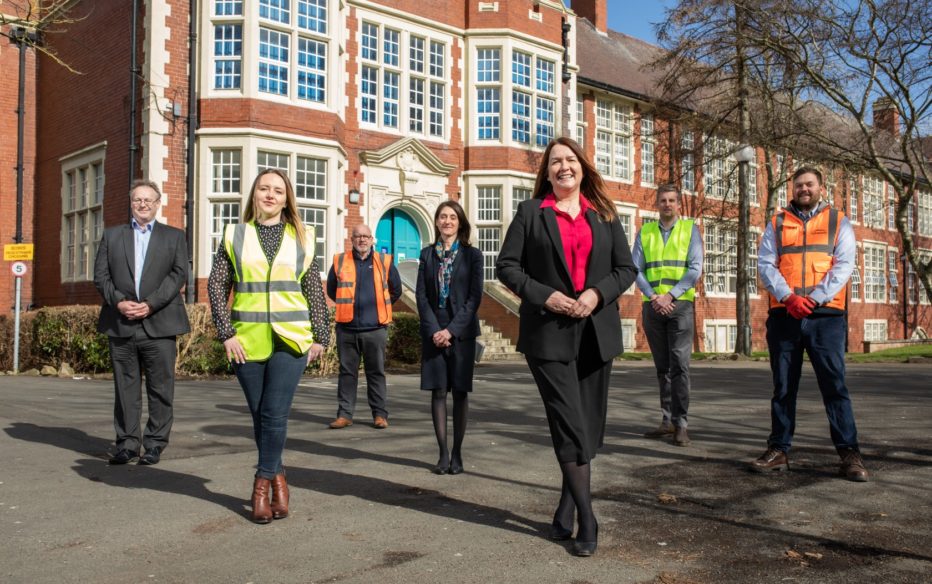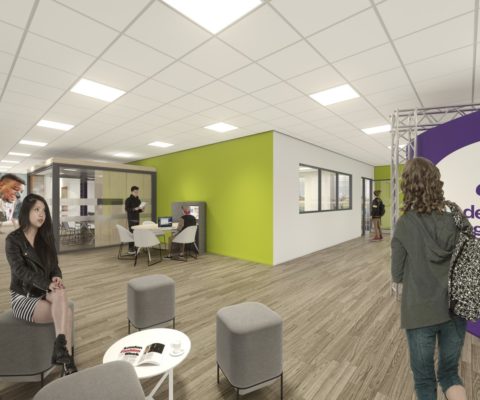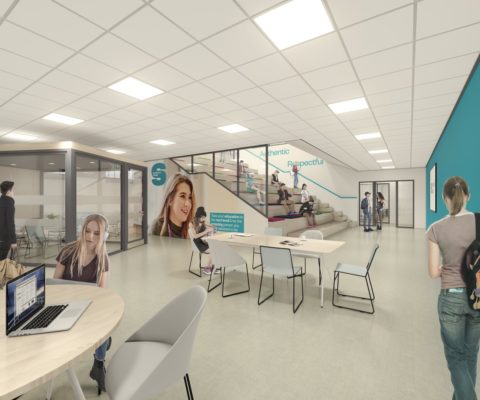

Sunderland College is embarking on a multi-million-pound redevelopment programme to transform a 1920s building at its Bede Campus into an immersive learning environment that will deliver the workers of tomorrow through new T Level qualifications.
The campus has played an integral role in students’ learning journeys for quite some time. More than 130 years, in fact.
From Sunderland Higher Grade School’s opening in the early 1890s, to its Bede Collegiate School evolution, Grammar Schools conversion and latter change to comprehensive status, the campus’ walls have long reverberated to the sounds of youngsters taking their first steps into the working world.
And now, thanks to a new development, those echoes are about to rise yet further.
For when the next academic year begins in September, so too will a new dawn for Sunderland College and its Bede Campus.
Backed by a successful £3 million T Level Capital Fund application, the campus’ Bede Building is being transformed into a world-class, cutting-edge immersive learning environment that will provide a backdrop for the provision of prestigious T Levels.
Launched last year by the Department for Education to nurture the talent of tomorrow, T Levels combine classroom and workplace learning, in the process affording students qualifications that are equivalent to three A levels.
The technical qualifications are designed with leading employers to ensure they meet future skills needs. Students gain a high-quality, nationally-recognised qualification, which includes a substantial work placement with an employer to develop a wide range of career-focused skills and competencies
Spearheaded by a three-way collaboration between education institutions, employers and businesses, T Levels marry skills development to industry’s ever-changing requirements, with Sunderland College operating at the very crux of the pioneering learning environment.
T Levels across construction, digital, health, science and education will begin at the college this year, with further courses in digital infrastructure, business administration and engineering and manufacturing starting in 2022.
And sitting right at the heart of it all will be the Bede Building.
Now undergoing a complete refurbishment, the 1920s structure will include a sophisticated, 360-degree immersive visualisation ‘dome’ that will allow students to train in a number of virtual reality scenarios, from tackling a medical emergency in a busy football stadium to learning a manufacturing company’s intricate factory operations miles from its physical base.
The redevelopment, managed by the country’s largest independent building surveying company Hollis, alongside construction partner ENGIE and Seymour Architecture, will also see the creation of an amphitheatre-style seated area, innovation suites and a living staircase that will provide significant collaboration space.
Furthermore, it will support the delivery of digitally-informed therapies for children and young people with special educational needs and disabilities.
It will be, says Judith Quinn, Sunderland College’s interim deputy principal – curriculum and achievement, a watershed moment for education in the city and region, which will provide unparalleled learning opportunities for students and connect employers with talent tailored to their specific needs.
“Technical education is an absolute cornerstone of what we do, and our roll-out of T Levels will really add value to our students’ learning,” she told North East Times’ editor, Steven Hugill.
“T Levels offer an excellent programme of study because of the technically- focused areas they cover and high-quality opportunities they can lead to.
“What we are doing through this development is bringing education and employers together to inform the curriculum while informing our curriculum teaching and learning too.”
The relationship, reveals Judith, has been strengthened by the creation of advisory boards, which operate as conduits between the college and industry to ensure teaching understands business’ requirements and adapts accordingly to maintain a rich and deep talent pool.
Judith says: “Such world-class facilities and the investment are fantastic for the college, the students and the schools in the local area.
“But for me, it is all about the opportunities it will afford to our learners in terms of their future prospects – and our industry advisory boards allow us to work with employers to co-design our curriculum to meet their skills needs.
“We have the Health and Social Care Academy of Excellence and the Future Technologies Focus Group, and will be launching similar groups focusing on education, construction and science in the near future too.”
While laying the foundations for long- term technical skills provision, Judith says the Bede Campus development and T Level roll-out will also play a crucial role in the present-day recovery from the effects of the COVID-19 pandemic, as many companies seek talent to complete delayed projects or kickstart fresh developments.
“There has arguably never been a better time for the college to be making this investment,” says Judith.
“With everything that has happened over the last year with coronavirus, to think we can really expand students’ opportunities and cultural capital by making sure the college is providing the skills that employers in the city of Sunderland and the wider region want and need right now is fantastic.
“It will also help with the need to level up the economy and the UK regions.
“That is why we continue to have great support from the city council and organisations such as the North East Local Enterprise Partnership; they are fully supportive because they want to do the best for the city, region and its people.
“They want to make sure the opportunities that are out there – from existing companies to new investments – are taken advantage of.”
Judith’s point on supporting the skillsets of the present-day is no better emphasised by Hollis and ENGIE, whose respective work in overseeing the campus’ refurbishment has led to two apprentices taking an active role in the redevelopment and the extension of links first forged through a successful site- based placement.
“We have two apprentices from our Newcastle office working on this project, and therefore gaining great experience, meaning the development has gone full circle,” says Paul Wharton, an associate with Newcastle-based Hollis, which has worked with Sunderland College on projects for the past six years.
He adds: “T Levels are what the industry needs; from the perspective of construction and surveying, we need people coming out of the education system with the right skills to excel.
“To be able to work on something that will help deliver T Levels locally, and ensure students are hitting the ground running skills-wise when they leave, is great for us as a company.”
And, while supporting local youngsters on their career journeys, Paul says he is also delighted to be part of a project that is strengthening ties with the region’s supply chain.
He says: “All of our sub-contractors are from the North East, and, as a local company, there is a real sense of pride in supporting a regional college deliver world-class educational facilities.”
Such satisfaction is mirrored by Jason Smithies, operations manager at Hebburn-based construction firm ENGIE.
Reiterating the practical impact of T Levels on sectors such as construction, Jason points to the firm’s existing relationship with Sunderland College that has seen aspiring electrician Reanna Wilson work with ENGIE and Gentoo on the city’s Keelman Rise housing development in a pilot placement ahead of the institution’s official T Level roll-out.
He says: “We have delivered a number of educational projects across the North East in recent years and have a fairly longstanding relationship with the college.
“But it is a privilege for us to work on a contract like this.
“There will be a real legacy for years afterwards from the work we have done here, not just for students but for industry too, in terms of us and other companies being able to recruit the workers of tomorrow.
“We already have Reanna working on Keelman Rise, which is a great experience for her, but, as part of us realising the vision of the Bede Building refurbishment, we are providing talks and site visits too.
“They will hopefully assist in helping students understand more about the construction sector and ENGIE.
“The construction industry has an ageing workforce, so if this project can help in some way to deliver the workers of the future, then that would be brilliant.”
And such marrying of the old with the new, says Judith, will be central to the Bede Building’s development, in more ways than one.
She adds: “This work is really respecting the Bede Campus, which has a lot of positive vibes with people in this region from its days as girls and boys’ Grammar Schools.
“It isn’t losing any of its history or status in this development, and nor are our learners.
“By creating such a fantastic space, alongside a future-focused curriculum, we will offer the most up- to-date teaching approaches to students that add real value to their learning and put them in the strongest possible position for successful careers.”
Article originally published by North East Times on 1 April 2021.




Sunderland College, as part of college group EPNE, receives an Outstanding rating across the board in its latest Ofsted inspection.
November 26, 2024

Sunderland College hosted another Young Seafood Chef of the Year national competition, with students competing to earn a place in the final.
July 8, 2025

Sunderland College’s first cohort of esports students are celebrating after receiving impressive grades in their technical qualifications.
September 26, 2024

98% of our students progress to a positive destination
(*Destination data for Sunderland College students aged 16-18, academic year 2017/18).

Our achievement rates are well above the national average.

We are the College of the Year.
(*Top college nationally for BTECs, Pearson 2019)

100% of our HND and HNC students progressed to employment or further study.
(*Destination data, academic year 2016/17, HNC 19+)

We have recently invested £50 million in our facilities.